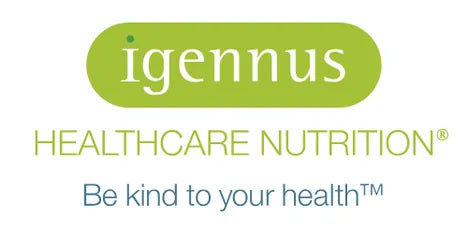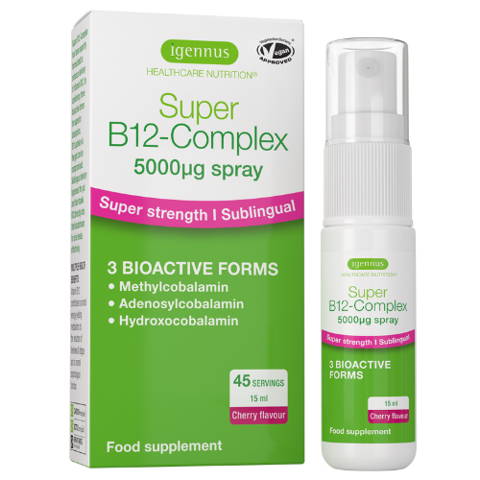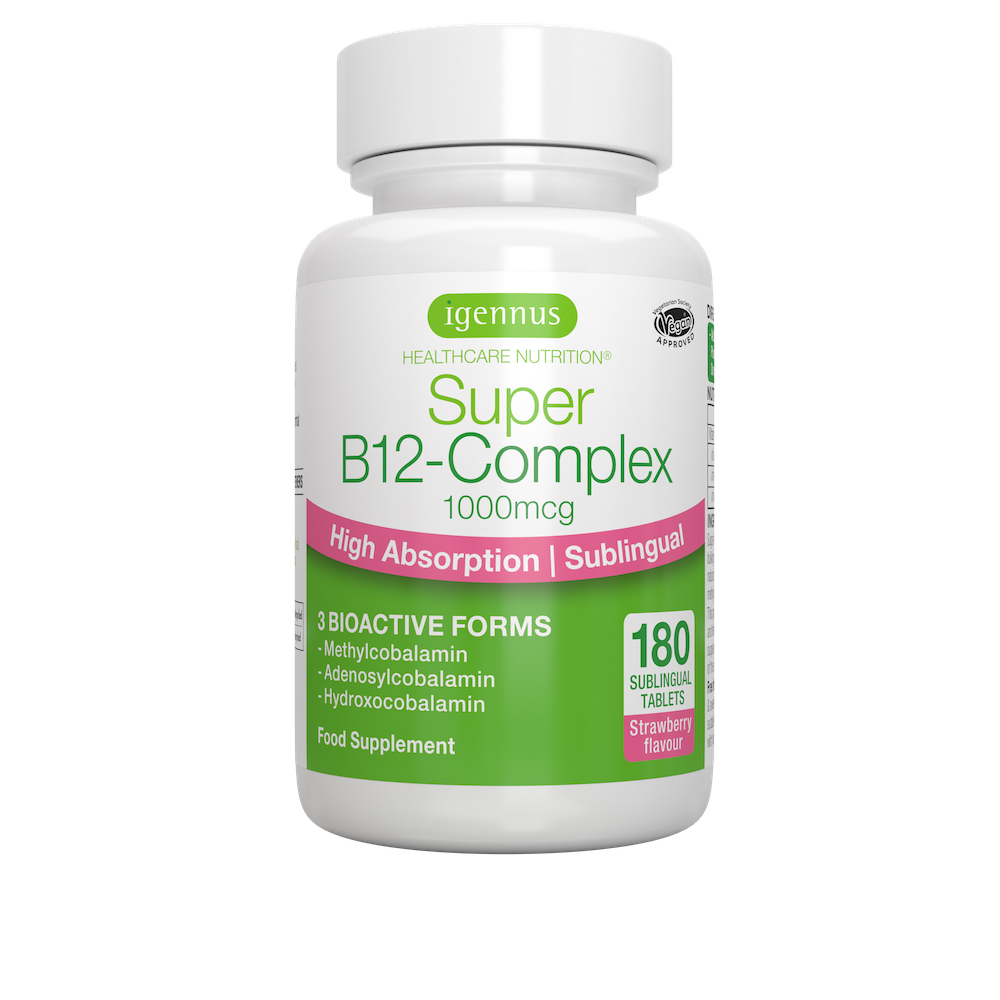Vitamin B12 has a complex absorption mechanism that becomes less efficient with age and a myriad of other factors, meaning that many of us have suboptimal levels. Vital for brain, nervous and immune system function, cardiovascular health as well as for energy production, B12 deficiency symptoms often manifest late and may be irreversible, making it critical to maintain healthy levels throughout our lifespan.

Sources of vitamin B12
Dietary B12 is found in animal products, with organ meats being the richest source; vegetarians and vegans are therefore at risk of deficiency. While certain vegan foods - e.g. yeast extract and some cereals - are fortified, the inferior cyanocobalamin form of vitamin B12 is used. Although some plant foods contain B12-like substances, these are not bioactive. (1)
Who is at risk of B12 deficiency?
Whilst many vegans and vegetarians know to supplement vitamin B12 due to a lack of dietary sources, B12 status depends on so much more than just dietary intake.
Inadequate consumption
Vegans, vegetarians and those consuming little animal protein won’t take in enough unless they top up with fortified food or supplements.
Inadequate storage
Those with liver disorders are at risk, as B12 is mainly stored in the liver.
Inadequate absorption
This is a common cause of B12 deficiency as the uptake mechanism is surprisingly complex.
● Decreased stomach acid and inadequate chewing: an acidic environment is needed to free B12 from food, but low stomach acid and poor chewing are common as we age, and amongst those on long-term antacid and proton pump inhibitor (PPI) medication. In this case, supplemental B12 is absorbed more easily as the acid-cleavage step is not required.
● Lack of intrinsic factor: stomach cells produce intrinsic factor, which binds with B12 for absorption in the small intestine. In pernicious anaemia, an autoimmune condition, the immune system attacks cells that produce this substance.
● Small intestinal disorders: those with gut conditions such as coeliac disease, inflammatory bowel disease and small intestinal bacterial overgrowth (SIBO), and those who’ve had the ileum - the part of the small intestine that absorbs B12 - surgically removed, are at risk.
Medication
Oral contraceptives and metformin are examples of medications which may lead to B12 insufficiency.
Genetic variations
Genetic variations can affect various stages of B12 absorption, transport and conversion to active forms. Vitamin B12 exists in multiple forms, with each transported around the body and within cells by specific proteins and then made bioactive by enzymes specific to each type. Those with genetic variations on particular B12 pathways may benefit from supplementation with alternative or multiple forms of B12 - including methylcobalamin, adenosylcobalamin or hydroxocobalamin.
Symptoms of vitamin B12 deficiency
B12 insufficiency can be hard to recognise, as symptoms sometimes appear only in severe deficiency and can be vague and difficult to diagnose. Unless someone is vegan, a lack of B12 is often not considered.
The most serious consequences are neurological. Vitamin B12 is important for the production of myelin sheaths, which are protective coatings around the nerves and brain cells. Nerve damage causes symptoms of tingling and numbness in the feet and hands, changes in gait, disturbed vision and cognitive decline. B12 also plays a role in hormone and neurotransmitter production, and a lack thereof may lead to irritability, depression and bipolar disorder.
Due to its role in DNA synthesis and red blood cell formation, B12 deficiency may result in anaemia (with symptoms such as pallor, dizziness, palpitations and shortness of breath) and damaged mucous membranes. In the mouth, ulcers or a bright red, painful tongue may occur.
B12 is needed for mitochondrial energy production, and for detoxification. A lack thereof may result in fatigue, an increased risk of chronic illness and poor immune function.

Forms of B12 and why to avoid cyanocobalamin
Cyanocobalamin is a synthetic form of B12 found in fortified food and ‘cheaper’ supplements. This form is unfavourable as it is not bioactive, needing to go through many steps in the body to be converted into one of the active types below, invariably leading to poorer B12 status than if supplementing an active form. It also contains cyanide which needs to be detoxified by the body. Cyanocobalamin is not well retained - studies comparing the effectiveness of different B12s show that this form has poorer cellular uptake and is lost up to three times faster in urine. (1)
The following forms are naturally found in food and each has their own individual benefits:
Form
Methylcobalamin
Adenosylcobalamin
Hydroxocobalamin
Functions
Neurotransmitter and blood cell formation, gene regulation , regeneration and protection of nerves and brain cells, vision, detoxification
Energy and haemoglobin production, brain development & growth, muscle development, immune system modulation, fat and protein metabolism
Detoxification of cyanide and nitric oxide - particularly beneficial for smokers and those consuming cyanocobalamin in B12-fortified food
Natural form
Yes
Yes
Yes
How to test your vitamin B12 level
A total blood B12 level is easy to organise through your GP or with a home test kit from a private lab. Be aware that a ‘holotranscobalamin’ test is more accurate and may detect deficiency sooner, as it measures the amount of active B12 bound to its carrier protein rather than just the total amount of vitamin B12 in the bloodstream. If you have signs of B12 deficiency despite a normal test result, it may be worth discussing a trial of B12 supplementation with your GP, as sometimes (for example, due to genetic variations) B12 struggles to enter cells, so deficiency symptoms can occur despite seemingly healthy blood levels.
Choosing a B12 supplement - factors to consider
Form of B12
Due to the complexity of B12’s absorption and transport around the body & within cells, and knowing that genetic variations can impede metabolism of various forms, if you’re looking to cover all bases it’s wise to supplement with a combination of methylcobalamin, adenosylcobalamin and hydroxocobalamin.
Studies have shown that when treating vitamin B12 deficiency specifically, hydroxocobalamin or a combination of adenosylcobalamin and methylcobalamin are a better choice than methylcobalamin alone. (2;3) Cyanocobalamin is best avoided as it’s not bioactive or as effective in raising B12 levels. If a supplement doesn’t list which form it uses, it’s likely cyanocobalamin.
Swallowed tablet or sublingual?
For all of the reasons mentioned above, B12 absorption through the gut from a swallowed B12 supplement may be suboptimal. If one has symptoms or a known deficiency, or is at risk of low B12 levels, use of an orally absorbed supplement is much more reliable: B12 is absorbed directly through the rich network of blood vessels under the tongue into the bloodstream. Sublingual supplements are easy to use and convenient for children and older adults who have difficulty swallowing.
Sublingual tablets & sprays
A sublingual B12 tablet offers superior delivery as it gradually releases B12 as the tablet melts, ensuring adequate time for absorption into the blood vessels. A spray supplement, squirted under the tongue is an excellent alternative. When considering either of these delivery systems, look for those which avoid artificial ingredients, or sugar which may promote tooth decay.
Dose
A surprisingly small fraction of ingested B12 is actually absorbed by the body (4), which is why the amount provided in supplements is much higher than the recommended daily value. B12 is safe in high doses - there is no ‘tolerable upper limit’ - and what the body doesn’t need, it simply excretes. 1000mcg per day, especially when taken sublingually, is an effective dose to either prevent B12 deficiency, or to support those with suboptimal vitamin B12 levels. For those in search of a higher-dose supplement, such as with B12 deficiency, 5000mcg per day can safely be used.
Vitamin B12 injections vs sublingual supplements
B12 injections, often delivering hydroxocobalamin, are used to support deficient B12 status. However, sublingual vitamin B12 supplements can be as effective as and even superior to injections at raising B12 levels (5), as the vitamin is absorbed directly into the rich network of blood vessels under the tongue. Sublingual delivery does not rely on intrinsic factor, so even those with pernicious anaemia now have an alternative to lifelong B12 injections. (6;7)
Super B12 Complex 5000mcg Sublingual Spray - natural cherry flavour
Ideal when a high-dose supplement is needed e.g. B12 deficiency
Our triple vitamin B12 spray is expertly formulated to ensure that this supplement is not only bioavailable and effective but also a pleasure to take.
- High-strength 5000mcg dose
- Sublingual spray for rapid absorption
- 3 natural, bioactive forms of B12 - methylcobalamin, adenosylcobalamin and hydroxocobalamin
- Sugar-free, no artificial colours or flavours
- Suitable for vegans and vegetarians
- Keto-friendly
- Cyanocobalamin-free
Super B12 Complex 1000mcg Sublingual Tablet - natural strawberry flavour
Ideal for preventing B12 deficiency or for suboptimal B12 levels
- Effective 1000mcg dose
- Sublingual dissolving tablet for optimal absorption
- 3 natural, bioactive forms of B12 - methylcobalamin, adenosylcobalamin & hydroxocobalamin
- Sugar free, no artificial colours or flavours
- Suitable for vegans and vegetarians
- Keto friendly
- Suitable for the whole family
- Cyanocobalamin free
References
- Paul C, Brady DM. Comparative Bioavailability and Utilization of Particular Forms of B12 Supplements With Potential to Mitigate B12 related Genetic Polymorphisms. Integr Med (Encinitas). 2017 Feb;16(1):42-49.
- Thakkar K, Billa G. Treatment of vitamin B12 deficiency-methylcobalamine?Cyancobalamine? Hydroxocobalamin?-clearing the confusion. Eur J Clin Nutr. 2015 Jan;69(1):1-2.
- Kamath A, Pemminati S. Methylcobalamin in Vitamin B12 Deficiency: To Give or not to Give? J Pharmacol Pharmacother. 2017 Jan-Mar;8(1):33-34.
- Rizzo G, Laganà AS, Rapisarda AM, La Ferrera GM, Buscema M, Rossetti P, Nigro A, Muscia V, Valenti G, Sapia F, Sarpietro G, Zigarelli M, Vitale SG. Vitamin B12 among Vegetarians: Status, Assessment and Supplementation. Nutrients. 2016 Nov 29;8(12). pii: E767.
- Bensky MJ, Ayalon-Dangur I, Ayalon-Dangur R, Naamany E, Gafter-Gvili A, Koren G, Shiber S. Comparison of sublingual vs. intramuscular administration of vitamin B12 for the treatment of patients with vitamin B12 deficiency. Drug Deliv Transl Res. 2019 Jun;9(3):625-630. doi: 10.1007/s13346-018-00613-y. PMID: 30632091.
- Chan CQ, Low LL, Lee KH. Oral Vitamin B12 Replacement for the Treatment of Pernicious Anemia. Front Med (Lausanne). 2016 Aug 23;3:38. doi: 10.3389/fmed.2016.00038.
- Delpre G, Stark P, Niv Y. Sublingual therapy for cobalamin deficiency as an alternative to oral and parenteral cobalamin supplementation. Lancet (1999) 354(9180):740–1.10.1016/S0140-6736(99)02479-4










